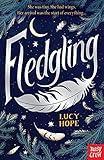
Price: £7.99
Publisher: Nosy Crow
Genre: Fiction
Age Range: 10-14 Middle/Secondary
Length: 288pp
Buy the Book
Fledgling
Lucy Hope sets her debut novel in a house that ‘stretches precariously to the sky’ on top of a tall rock in the Bavarian Mountains. Munich is just visible beyond the forests; at the city’s Opera House, the mother of our heroine Cassie reigns as Principal Soprano. The house is a ‘monument to the dreams of five generations of the Engel family’, as though each of its five storeys has been balanced – rather than built – one upon the other. Access to the house used to be by way of a mechanical contraption which winched up its terrified passengers, bumping against the rock walls en route. It was Cassie’s grandfather who dynamited a helter-skelter of a road around and around the rock up to the top.
Indoors, a quirky library reflects the esoteric interests of previous Engels. There’s a room crowded with stuffed owls, a lethally dangerous open-sided lift running through the centre of the building, and numerous stores crammed with obsolescent machinery. Several of the occupants are many times larger than life. Cassie’s melodramatic Mother is cold and distant towards her daughter, indifferent towards her husband and a snob towards everyone else. Papa came home from the war a broken man – which war exactly we’re never sure, but we know we’re in an era of horses and carriages. Papa drinks heavily to drown his memories, though his energies return when indulging his passion for taxidermy; unfortunately, he is no use at stuffing animals. Somewhere up on the third floor, Cassie’s Grandma is slowly dying, her pain relieved only by an antiquated brass morphine pump. Every now and again, two local nurses, known to everyone as Frau Crunch and Frau Grind, drop in to check on her, bringing with them some lively knockabout humour and chat. Though, it turns out, there’s more to them than that… Then there’s the enigmatic maid, Emaline, who’s been with the family for ever, but nobody knows anything about her. There’s more to her too…
The initial account of the house and its occupants already suggests that there will be an edge of comedy and caricature throughout this story, no matter how frightening Cassie’s subsequent adventures turn out to be. Her friend, the very likeable Raphael, is involved in just about all those adventures, which are triggered as early as Page 5 when a cherub (rarely encountered in fiction or life outside the frame of a painting) suddenly hurtles through Cassie’s bedroom window. It’s that sort of plot. Expect the Unexpected, which here involves ferocious clashes between hosts of angels and flocks of repulsive Sturmfalken (yes, Storm Falcons) notable for their overwhelming stench and slashing talons (Ms Hope is very good at violent action). Adventure piles on adventure, with the pace maintained by a narrative told in the storyteller’s dramatic present throughout. In passing, we learn some surprising truths about why and how angels need to visit Earth; sometimes, indeed, they assume mortal form without the knowledge of the bodies’ original owners, who are naturally disconcerted when two lumps appear in their backs and burgeon into huge wings.
It may be that all this inventive action lacks a larger context other than the knowledge that generations of Engels have had similar problems. A brief comparison might clarify my point. Readers of Ged’s personal conflict at the climax of Ursula le Guin’s A Wizard of Earthsea are keenly aware that the outcome is critical – the balance of the world itself is at stake. In Fledgling, everything seems local. Readers might well be left wondering whether greater powers drive those evil Sturmfalken, or inspire the hosts of angels. Is this an episode within a greater struggle between mighty powers, or is it some self-contained skirmish? Even so, the novel’s attractive strengths suggest that this author’s next book will be awaited with eager interest.



